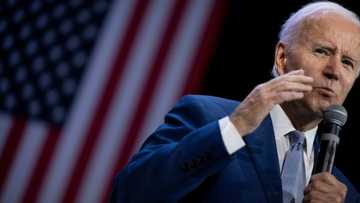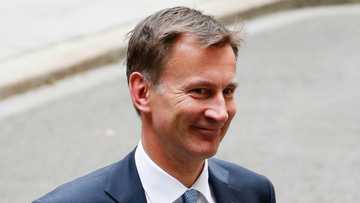US airlines cheer travel boost from shift to hybrid work

Source: AFP
PAY ATTENTION: Click “See First” under the “Following” tab to see Legit.ng News on your Facebook News Feed!
US airlines say they are reaping the benefits of a growing trend of hybrid work that allows employees to travel more frequently as Covid-19 restrictions ebb.
Carriers including American Airlines, United and Delta highlighted the phenomenon on a series of conference calls as they reported banner results on continued strong travel demand.
The increased adoption of virtual meetings, such as through Zoom, has eased the chains that once bound office workers to their desk, allowing greater flexibility.
Get-away weekends are going longer, meaning an excursion that might have previously lasted from Friday night to Monday morning might now return on Tuesday or leave on Thursday.
Prior to the pandemic, United Airlines would trim its transatlantic flights in the middle of the week. But this winter, more flights are planned for Europe "throughout the entire week," said United Chief Commercial Officer Andrew Nocella.
The dynamic also means more travel outside of the traditional school holiday period, with Delta pointing to exceptional activity in Florida last month.
PAY ATTENTION: Share your outstanding story with our editors! Please reach us through info@corp.legit.ng!
"If you look at September which is historically one of the worst months for Florida, you couldn't buy a ticket to Disney," said Glen Hauenstein, president of the Atlanta-based company.
"You had some people who were on break here, and they said they wanted to go to Disney with their families and they couldn't buy a ticket."
A portion of these trips outside conventional travel periods may also be the result of deadlines for consumers to use flight credits for canceled Covid-19 travel, Atmosphere Research's Henry Harteveldt said.
"Some part of it may be driven by the fact that the summer was simply too busy and they were priced out of the market or decided they did not want to travel," he added.
Changing behavior
Airlines said they expect the trend to hold for at least a while longer. This will include the upcoming holiday season, when traffic is expected to be elevated throughout the month between Thanksgiving and Christmas.
Such an expanded travel calendar with less pronounced peaks enables carriers to spread out their labor.
"We staff our pilot workforce for the flying that we do from June 15 to like August 15" Nocella said. "If we can staff for a much larger chunk of time, that should be incredibly efficient."
The boost comes as airlines still are not yet seeing a full recovery in lucrative business travel that has long been a critical source of revenues. One downside of the new environment is that some of these revenues may not return.
"A lot of people who used to be frequent travelers used the time during the pandemic to reassess that part of their lives," Harteveldt said. "A lot don't want to be road warriors anymore."
On the other hand, when people do travel for work, they are more frequently deciding to extend their stays due to the greater acceptability of remote work.
American estimates that 45 percent of its revenues now come from travelers who are mixing business and leisure travel, whereas 30 percent comes from tourism and 25 percent from business travel.
Airlines cite another boon from this trend: More consumers who sign up for airline rewards programs, or purchase their tickets directly on a carrier's website, said Robert Isom, chief executive of American.
The latest earnings reports also showed that airlines are still getting a lift from increased sales of premium tickets from travelers who have become more accustomed to paying more.
"They are willing and able to pay for better comfort, for better services, to reduce some of the stress and hassle," Harteveldt said.
But analysts are less sure the higher prices will stick, especially with the threat of a recession due to elevated inflation.
"It's definitely difficult to speculate," said Chris Raite, an analyst at Third Bridge. "We're watching to see if airlines can hold the pricing power in the fourth quarter and 2023."
Source: AFP





